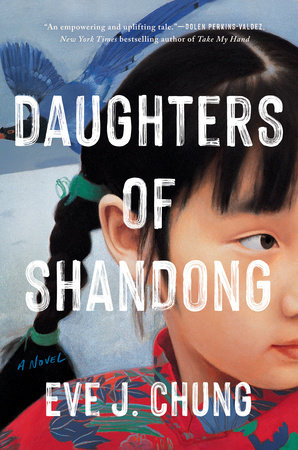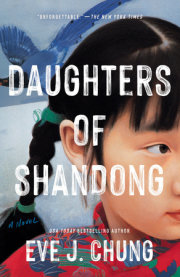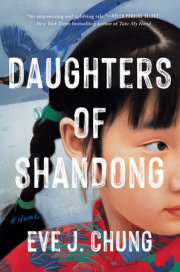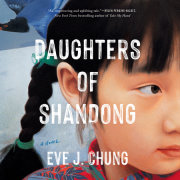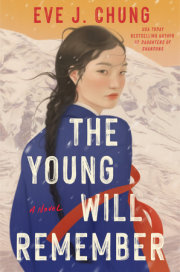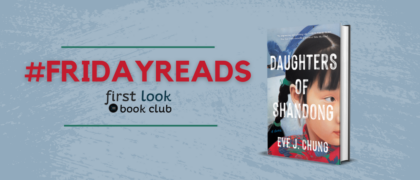1
Heirless
Nai Nai said whores weren't allowed in the house, so she kicked Mom out, slamming the wooden door shut with a clatter that startled the birds. We didn't know where my sister Di was, but Three and I sat beside Mom as she leaned against the courtyard wall of our shiheyuan, hands red and chapped from washing dishes. "Don't worry," she said to us. "She'll calm down when your father comes home." Nai Nai was a small, thin lady with ebony hair, birdlike hands, and dainty bound feet. Yet, even as she tottered in her small silk slippers, she had the presence of a warlord and a tongue like a whip. I was eleven, and old enough to know that no one could calm her after such a rage, not even her first and favorite son.
It was fall, and dried leaves swirled in the chilly wind, skimming yellow grass that swayed gently. Luckily, the harvest was finished and most of the workers had gone home. Mom didn't want reports of this shameful spectacle to make the rounds-the peasants hated Nai Nai as much as they loved gossip, and this story would have spread like a wildfire. We lived in rural Zhucheng, a small town where my family reigned. For generations, our men had excelled in imperial exams, earning prestigious government positions and building an empire through renting land and running businesses. Our palatial shiheyuan, with its gleaming orange tiles and wooden latticed panels, was an ostentatious testament to our wealth. Magnificent stone lions framed the entrance of the courtyard, which was large enough for a lotus pond full of shimmering koi. They swam in circles lazily, eyes globular, and gulped at two-year-old Three as she peered into the water.
Nai Nai had a nose for lies and could almost always tell when a secret lurked inside her walls. Still, Mom had been hiding her pregnancy for weeks. "It will be a boy this time. I can feel it, Li-Hai," she said to me repeatedly, as though her anxious mutterings could manifest a son. As soon as I was born, I was a disappointment. When Second Sister arrived one year later, she was a failure. Father wistfully named her Li-Di, since di meant "younger brother." Then Third Sister came along, a catastrophe so horrific that she got only a number: Three.
Three girls rattled the Angs enough for Nai Nai to take drastic measures. Though she watched every coin like it was a fragment of her soul, she decided to trade an ounce of gold for a glimpse into the future. Together, she and Mom went to a famous fortune-teller in a neighboring town and asked if a male heir was forthcoming. Mom wrote down the date and time of her birth as he examined the lines on her palm, reading it like it was a map of her life. Handing Mom an amber amulet for protection, he declared solemnly that Mom would not have a son until she turned thirty-six.
Mom was only in her late twenties then, but Nai Nai came home giddy, delighted that an heir would arrive eventually. She ordered my parents to sleep in separate rooms and forbade them from having intercourse until Mom's thirty-sixth birthday. Lauding herself for her ingenuity, she boasted, "This will save us the expense of raising additional daughters!" After all, girls were nothing more than wives for other people's sons.
Father obeyed and set up his own bedroom, but he told Nai Nai that fortune-tellers were a scam. "We make our own fate," he insisted, a feeble protest that she ignored. At night, Nai Nai remained a vigilant guard, monitoring the hallway with bizarre frequency. Despite her enthusiasm, even the fiercest dragon succumbs to slumber. A few months later, Mom became pregnant for the fourth time.
"Don't tell anyone," Mom whispered to me, and continued her chores as though nothing had changed. Every morning, she woke up at four a.m. to cook breakfast for about eighty workers who lived on and tilled our land. They began work at dawn, so Mom had to grind flour by lamplight. She was a fantastic cook, and made buns and dumplings like they were art. With deft hands, she could roll dough thin like paper for butterfly wontons, knead fluffy, airy dessert bun clouds, and pull springy, chewy bread that rose like soldiers saluting in the steamer.
Despite our wealth, Nai Nai watched the pantry with military precision. Every evening, she weighed the flour to make sure that Mom wasn't being too generous to the workers. The food was never enough, so Mom snuck extra helpings where she could. Through practice, she learned to spin white lies that squeaked under Nai Nai's shrewd radar. Once, Mom made pork buns for a worker's sick child and told Nai Nai the meat was gone because it had spoiled. She passed extra noodles to everyone, and then claimed that mice had broken into the pantry. The workers appreciated Mom and understood the gravity of these risks, because they had a saying: "Wild dogs are dangerous, and ghosts are scary, but nothing is more terrifying than Madame Ang," my Nai Nai.
Nai Nai could have hired servants to help Mom with her tasks, but she considered frugality a pillar in sustaining the Ang fortune. Also, she detested Mom-first, for marrying her son, and second, for having large feet. My parents had been betrothed as infants, and Mom's family, the Daos in Rizhao, were biao cousins of the Angs. Biao cousins had different surnames and, at that time, could marry one another, but tang cousins, who shared the same surname and family tomb, were akin to siblings.
The Daos owned the majority of the ships in Rizhao's waters and prospered through maritime trade. A wealthy girl like Mom should have had properly bound feet, and my Lao Lao had tried to bind them-she had wrapped Mom's feet early on, insisting that a happy husband was worth the agony of broken bones. In Lao Lao's world of silk and porcelain, the freedom to walk was an acceptable price to pay for a man's affection. The Kuomintang, the Nationalist government, however, had banned foot-binding, and their campaigns against it grew increasingly aggressive. After a few years, Lao Lao grudgingly cut Mom's bindings. The damage, however, was irreversible. For the rest of her life Mom hobbled, her feet having been molded flat on the bottom with a pronounced arch at the top.
Nai Nai, meanwhile, had remained defiant before the Nationalist prohibition. She was proud of her three-inch lotuses, and no government lackey could scare her into relinquishing thousands of years of tradition. "Large feet are for peasants," Nai Nai said with disdain when seventeen-year-old Mom arrived for the wedding. "If you aren't a proper lady, you might as well be useful!"
I wished that young Mom had heeded that red flag and fled back to Rizhao, begging her parents for another match. Instead, she went ahead with the ceremony, cutting ties with the Daos-a bride's mother used to throw a bucket of water out the front door after the wedding to symbolize that her daughter, like the water, could never return.
Salivating, Mom told me that her parents sent crates of crabs for that banquet, which ended up being her last special meal. In our shiheyuan, Mom was not allowed to eat crab, because Nai Nai reserved delicacies for the men. Instead, Mom had to crack open the shells and pluck the soft flesh into bowls for Father and Yei Yei. She might have snuck a bite here or there, but it was a great change from her childhood of abundance to her married life, taking a quick morsel while hunched over a counter, with one eye on the door. In her own house, my mother was a thief of minuscule riches, eating these stolen tidbits not only for the taste but for the evocation of childhood memories, the only luxury that she could keep for herself.
On the morning of our eviction, Mom had been in the kitchen poaching eggs for Nai Nai's breakfast. As she filled the sink with water, the smell of dirty dishes triggered a bout of nausea and she vomited. Sirens went off in Nai Nai's head, and she launched her accusations like cannonballs. "You're pregnant, aren't you?" she cried, upending the remainder of her soup, white threads of egg sloshing all over the table. Mom should have lied, but she was too sick to think straight and crumbled under Nai Nai's glare. She nodded.
Grabbing Three, I dove underneath the table as Nai Nai began yanking bowls from the cabinets. Angry Nai Nai didn't care about wasting money, which meant she didn't care about anything. Screaming, she hurled the bowls at Mom, who covered her head as they shattered like ceramic bombs against the wall. Sharp shards scattered across the floor as Three shook in my arms-she knew better than to cry when Nai Nai was in a mood. "My son would never disobey me!" Nai Nai shrieked, her aim worsening with her mounting fury. "You must have had an affair. Tell me who it is. Is it one of the workers? Whoever it is, I'll find out!"
Her tirade lasted at least ten minutes and ended with "Whores go to hell!" and the three of us outside without our jackets. As I wrapped my hands around my bare arms, I wondered what Nai Nai would have done if the fortune-teller had said that Mom would never have an heir. Would she have killed her? Sold her? It was hard to say. I'd lived with Nai Nai all my life, and I wanted to believe that there was a limit to her cruelty. However, the old lady continued to surprise me.
From across the koi pond, my cousin Chiao stepped into the courtyard, clutching a toy sword in his sausage fingers. "Auntie! Hi, Auntie!" he yelled, skipping toward us, his round belly bobbing. "Look what Yei Yei brought me! Hai, wanna play bandits and warlords? You have to be the bandit since you don't have a sword."
Before I could reply that bandits had swords too, Mom said, "Chiao, run inside and get some warm clothing for Hai and Three. It's getting colder now that the sun is setting. When you are back, you and Hai can play."
"Okay!" Chiao agreed cheerfully, not bothering to ask why we were stuck outside. Within our shiheyuan, Chiao was in his own bubble of favor, and it did not occur to him that we were being punished. After all, he was the coveted son of Father's younger brother, Jian, and the only grandson in my generation. He got the best of everything-including crab! Nai Nai gave him crisp fried dough for breakfast and slabs of soft braised pork belly for lunch. Yei Yei said only boys got gifts, and he returned from Qingdao with trinkets for Chiao, while Di and I watched, empty-handed. Girls were lucky to be housed. We were lucky to be raised. We were lucky to be fed.
I was jealous of Chiao, but I knew that only men could worship our ancestors at the family tomb; only Chiao could provide for Nai Nai and Yei Yei, and my own parents, in the afterlife. Di and I were taught to pray for Chiao's success, and I did, because Mom's welfare in the spirit realm would depend on him one day. Zhong nan qing nu, an idiom that meant "Value men and belittle women," was embedded in my understanding of our world.
It was almost sunset when Father came home, a leather bag on his shoulder, Mom frantic at the gate. Three and I waited outside as Father went to find Nai Nai and confess his complicity in the betrayal, his wife trailing small in his shadow. Mom said that once upon a time, Father loved her; I was just too young to remember it. Maybe it was true, but I saw my parents as a land animal and a sea animal chained together, forced to remain on the water's edge-each surviving but neither thriving. When they were younger, Father supposedly snuck Mom pork hock stew from the kitchen and brought her flowers from the field. He changed after he went to study literature at university in Qingdao, shortly before the Japanese invasion. To escape the Japanese bombs, we temporarily moved farther north, to Weihaiwei, a former British territory on Shandong's coast, while Father remained in school. His education transformed him into a man who spoke in proverbs and dwelled in the realm of poetry. After the war, he returned to a wife who knew only cooking and farming. Once surrounded by inspirational teachers and like-minded scholars, at home he found himself in a vacuum of silence, which gradually filled with his resentment. Filial piety, however, required him to produce an heir. His misery-and hers-was irrelevant.
Father opened the door, and Three and I entered the kitchen to find Mom sweeping up the broken bowls. Nai Nai sat red-faced at the table, simmering. "Six more years! All I asked you to do was wait six more years! Now there will be another useless mouth to feed!"
"You can't take the fortune-teller so seriously," Father said quietly. "It could be a boy."
Nai Nai was unmollified, but she couldn't stay mad at her son. Instead, she focused her ire on Mom, blaming her for being a temptress. "I told you not to fight fate, but you didn't listen," Nai Nai said angrily. "Your arrogance has invited misfortune, and your daughter will be a blight on our household!"
That evening, while Father ate the dinner that Mom had cooked, Mom had to kneel on the floor-Nai Nai's favorite punishment to mete out. I grew up watching my mother on her knees, sometimes for an entire evening, for minor transgressions, like spilling soup. Solemnly, I looked at her, but she would not meet my gaze. Small, shiny teardrops fell from her eyes like pearls, shattering as they hit the tile. I hope that when I grow up, I can have a son, I thought, seeing my own future in her helpless form.
Life was unfair, but Mom said that it could always be worse. "Be grateful," she told me. "At least you were born to a good family. You will likely marry a rich man and have a comfortable life." I dreaded marriage, but it was as unavoidable as death. If I was lucky, maybe I would pair with a man with a kind mother-or a dead one.
2
Three Sisters
In July 1948, Mom went into labor with the summer heat hanging over her and with Nai Nai complaining bitterly beside her. A baby cried, and Nai Nai let out an anguished wail. Fourth Sister had arrived, and she was an abomination. Father didn't bother to name her, so Mom called her Li-Lan, with lan meaning "orchid."
Copyright © 2024 by Eve J. Chung. All rights reserved. No part of this excerpt may be reproduced or reprinted without permission in writing from the publisher.

